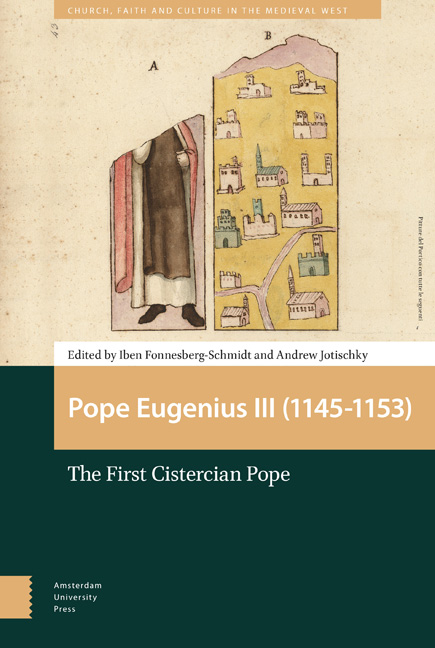Book contents
- Frontmatter
- Contents
- Preface
- Abbreviations
- Maps and Figures
- Introduction
- 1 ‘Justinian’s Laws, not the Lord’s’: Eugenius III and the Learned laws
- 2 Curial Politics and Papal Power : Eugenius III, the Curia, and Contemporary Theological Controversy
- 3 The Cistercians, Eugenius III, and the Disputed York Election
- 4 Eugenius III and the Crusades to the East
- 5 Eugenius III and the Northern Crusade
- 6 The Benefits of Exile
- 7 Eugenius III and France: the Protected Protector
- 8 A Golden Rose and the Deaf Asp that Stoppeth her Ears: Eugenius III and Spain
- 9 Eugenius III and the Roman Commune
- 10 Eugenius III Reclaims the Patrimony of St Peter
- 11 Eugenius III’s Privileges to Cistercian Houses
- 12 Eugenius III at Cîteaux, 1147
- 13 Eugenius III and the Church in the Crusader States
- Index
7 - Eugenius III and France: the Protected Protector
Published online by Cambridge University Press: 22 December 2020
- Frontmatter
- Contents
- Preface
- Abbreviations
- Maps and Figures
- Introduction
- 1 ‘Justinian’s Laws, not the Lord’s’: Eugenius III and the Learned laws
- 2 Curial Politics and Papal Power : Eugenius III, the Curia, and Contemporary Theological Controversy
- 3 The Cistercians, Eugenius III, and the Disputed York Election
- 4 Eugenius III and the Crusades to the East
- 5 Eugenius III and the Northern Crusade
- 6 The Benefits of Exile
- 7 Eugenius III and France: the Protected Protector
- 8 A Golden Rose and the Deaf Asp that Stoppeth her Ears: Eugenius III and Spain
- 9 Eugenius III and the Roman Commune
- 10 Eugenius III Reclaims the Patrimony of St Peter
- 11 Eugenius III’s Privileges to Cistercian Houses
- 12 Eugenius III at Cîteaux, 1147
- 13 Eugenius III and the Church in the Crusader States
- Index
Summary
Abstract
A Cistercian monk in Burgundy, Eugenius III increased links between the papacy, the French Church, and King Louis VII. With the help of other great figures such as the abbots Bernard of Clairvaux, Suger of Saint-Denis, and Peter the Venerable of Cluny, pope and king used their powers to maintain their sovereignty over the French Church and realm. Negotiations between Eugenius III and Louis VII in 1145–6 led to the call for the Second Crusade and while the king was overseas (1147–9), Abbot Suger and Count William of Nevers acted as regents for the kingdom. From March 1147 to May 1148, the pope sought shelter in France, reforming churches and dispensing justice at the Council of Reims (1148).
Keywords: Bernard of Clairvaux; King Louis VII; crusade; Church reform
The French realm and its dynamic Church played a major role in Eugenius III's pontificate, not least because of the crusade led by King Louis VII, the refuge given to the Roman Curia in 1147–8, the Council of Reims in 1148, and many meetings and letters between the pope, French prelates, and lay lords. As a Pisan, Bernard, elected as Pope Eugenius III in 1145, probably knew French, but did not have a good knowledge of France before his pontificate. It is true that in 1138, abandoning his wealthy cathedral chapter of Pisa, he was attracted by the rough life of prayer, poverty, and penance in the Cistercian monastery of Clairvaux in Burgundy, headed since 1115 by the now famous abbot, Bernard. Inside the abbey, however, as a simple monk Bernard was largely kept out of the world. Moreover, he remained in France for less than two years before being sent back to Italy to establish a Cistercian community at the Roman monastery of Tre Fontane (1140–5). Here Bernard had opportunities to deal with affairs generated by the papal court, and might even have met French prelates on their way there, but he was far from France. Yet during Eugenius's pontificate the special links between France and the papacy, tightly woven from the middle of the eleventh century – if not indeed from as early as Pepin III and Charlemagne hundreds of years earlier – developed on a new scale.
- Type
- Chapter
- Information
- Pope Eugenius III (1145–1153)The First Cistercian Pope, pp. 197 - 218Publisher: Amsterdam University PressPrint publication year: 2018



